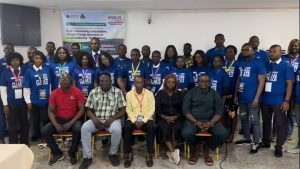Connected Advocacy, with support from LEAP Africa and Nigeria Youth Future Funds, commenced the Bayelsa Climate Ambassadors programme with a one-day capacity development workshop on youth community consultation, climate change education and local leadership for resilience in Yenagoa, the Bayelsa State capital on Tuesday, July 23, 2024.

Themed “The Solution is Indigenous, building local youth capacity to tackle climate crisis in our communities”, the workshop focused on youth community organisation, the imperative for climate change education, strategic advocacy and team building for results.
The event aimed to empower the shortlisted Ambassadors with the knowledge and skills necessary to address climate change and promote sustainable practices within their communities.
In his opening remarks, Mr Jeremiah Daganawho, Director of Climate Change, Bayelsa State Ministry of Environment, charged the Ambassadors to be worthy representative of their communities. He encouraged them to go back with the knowledge they will gain here to empower their communities that climate change concern affects all and no one should be left behind. Messages highlighted the critical role of local leadership and youth involvement in climate action, reinforcing the importance of the day’s discussions.
Prince Israel Orekha, Executive Director of Connected Advocacy and convener of the event, attempted an overview of the session, explaining the objectives and the importance of grassroots engagement in climate action.
The moderator, Mr Henry Adike Coker Joseph, field officer in SACA and Communication and Brand Officer of the project, introduced the Monitor and Evaluator of the Bayelsa Climate Ambassador who is the Executive Director of SACA, setting the stage for an informative and engaging session with responses from the ambassadors. He later took them through the various monitoring and evaluation sessions.
Dr. Ayodele Oyedeji from institute of Biodiversity, Climate Change, and Watershed, Niger Delta University, spoke on the concept and science of climate change and global warning. He provided a foundation for participants, emphasising the importance of understanding climate science to develop effective local solutions.
This was followed by a pre-test to gauge participants’ initial knowledge of climate-related issues, which helped tailor the subsequent sessions.
Wakedai Davidson Ere of the Bayelsa State Ministry of Environment who was represented by Mr Charles Iriakuma Ayebaesin, scientific officer, Department of Climate Change, gave an extensive discussion around climate change and how it affects local communities, sharing light on vulnerability, methodology to ensure environmental sustainability with local solutions. He also highlighted relevant works within the Niger Delta region and why everyone needs to be onboard.
Anayio Augustine Ngode, another facilitator, focused on community organisation using the smart advocacy model, covering the essentials of advocacy: what it entails, where it should be applied, and how to execute it effectively. This session equipped ambassadors with crucial advocacy skills, enabling them to promote climate action in their communities.
The ambassadors were divided into six thematic working groups, with each group focused on a specific climate-related issue: Just Transition/100% Renewable Energy, Deforestation/Food Systems, Environmental Pollution/IOC Divestment, Open Defecation, Plastic Pollution/Marine Litters, as well as Disaster Risk/Loss and Damage Financing.
The ambassadors identified issues, root causes, opportunities, immediate solutions, long-term solutions, and methods to ensure the sustainability of their proposed solutions. They also discussed the role of ambassadors in implementing these solutions and planned to return to their communities to further identify, create awareness and advocate to address these issues.
The Bayelsa Climate Ambassadorship Programme, according to the promoters, increased participants’ understanding of climate change, provided them with essential advocacy skills, and inspired them to take proactive steps toward sustainability in their communities.
The event, they added, underscored the importance of indigenous solutions and local leadership in addressing global climate challenges, setting the stage for continued grassroots climate action in Bayelsa State.
